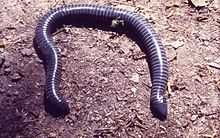Siphonops annulatus
| Ringed caecilian | |
|---|---|
 | |
| Conservation status | |
| Scientific classification | |
| Kingdom: | Animalia |
| Phylum: | Chordata |
| Class: | Amphibia |
| Order: | Gymnophiona |
| Family: | Siphonopidae |
| Genus: | Siphonops |
| Species: | S. annulatus |
| Binomial name | |
| Siphonops annulatus (Mikan, 1820) | |
| Synonyms | |
|
Caecilia interrupta Cuvier, 1829 | |
The ringed caecilian (Siphonops annulatus) is a species of amphibian in the family Caeciliidae from South America.[2] It might have the broadest known distribution among terrestrial caecilian species.[3]
Description
Ringed caecilian measures 286–450 mm (11.3–17.7 in) mm in total length. The body is cylindrical and slightly wider than deep. It is bluish-black to slate in colour. The annular grooves that completely encircle the body (except the 3–4 posteriormost ones) are edged in white or cream.[3]
Distribution and habitat
Widely distributed east of the Andes: originally discovered in Brazil,[2] reported to exist in Argentina, Bolivia, Colombia, Ecuador, French Guiana, Guyana, Paraguay, Peru, Suriname, and Venezuela. Its natural habitats are subtropical or tropical moist lowland forests, dry savanna, moist savanna, subtropical or tropical moist shrubland, subtropical or tropical seasonally wet or flooded lowland grassland, pastureland, plantations, rural gardens, and heavily degraded former forest.[1]
Reproduction
Nestlings are equipped with 44 spoon-shaped teeth to feed on the outer layer of their mother's skin. Young feed all at once for some seven minutes; then they all rest for three days as the female grows a new outer skin layer.[4] This phenomenon is known as maternal dermatophagy. This practice and morphological similarities are shared with its African relative Boulengerula taitana, suggesting it evolved over 100 million years ago.[5]
References
- ↑ 1.0 1.1 Lavilla, E., Hoogmoed, M., Reichle, S., Baldo, D., Wilkinson, M. & Measey, J. (2010). "Siphonops annulatus". IUCN Red List of Threatened Species. Version 2013.1. International Union for Conservation of Nature. Retrieved 6 July 2013.
- ↑ 2.0 2.1 Frost, Darrel R. (2015). "Siphonops annulatus (Mikan, 1820)". Amphibian Species of the World: an Online Reference. Version 6.0. American Museum of Natural History. Retrieved 13 April 2015.
- ↑ 3.0 3.1 "Siphonops annulatus". AmphibiaWeb: Information on amphibian biology and conservation. [web application]. Berkeley, California: AmphibiaWeb. 2015. Retrieved 13 March 2015.
- ↑ David Attenborough: Life in Cold Blood, page 28. BBC Books, 2008.
- ↑ Mark Wilkinson et al. (June 2008). "One hundred million years of skin feeding? Extended parental care in a Neotropical caecilian (Amphibia: Gymnophiona)". Biology Letters 4 (4): 358–61. doi:10.1098/rsbl.2008.0217. PMC 2610157. PMID 18547909.
